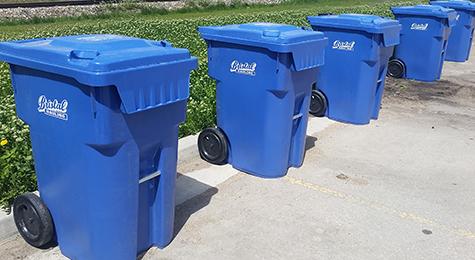The leaders of our community recently decided it was time to talk trash… both literally and figuratively. How strange that a community that still had burn barrels 20 years ago would find the subject of recycling so complex and contentious. It’s a testament to our commitment to good stewardship, and for this we should commend our leadership.
Every idea has two parts in implementation: creating the plan and executing/communicating that plan. To get it right, either in actuality or just in perception, you have to do both parts well. Fail on either one and the idea may fail. Lots of well-conceived plans can fail due to poor communication, and even well-communicated ideas can fail when they don’t actually work.
Enter the auto-bin, town council’s newest unveiling in municipal services. In the interest of disclosure, I am not a big fan. They are bulky and unsightly; I have yet to find a place to put them at my house. But we elect council to make decisions—to study various options to the problems we face, and then determine the most prudent course of action.
Talking to members of council, I understand the financial pressure they face. The costs of waste management have climbed in part due to rising dump fees, which are used to deter waste and encourage recycling.
Although we know that the auto-bin solution offered by our current provider was the least expensive, we don’t know what other options were considered. Not a problem, as it’s the job of our administrators to complete the analysis, but why did we change to the auto-bin system over the old system? Is it possible that the old provider couldn’t provide a competitive price due to the costs of them having to upgrade to auto-bin-capable trucks? Will the inherent limit on recycling now discourage full compliance and drive up our waste volumes?
Without this information, I can’t say whether council made the right decision.
Council’s communication about the new program has been unclear since it was first announced. Residents were left with many questions. Especially on social media, it seems that some council members and the public forgot how easy it is to misinterpret the written word. After all, written comments can be read from different perspectives. What happens when people get worked up and forget to critique the ideas rather than the person presenting those ideas?
I do not like the auto-bin system, yet I also know that I may be an outlier. My recycling bin is quite full after a single week, whereas my waste is seldom at half-capacity. I could likely go weekly on recycling and every two to three weeks on trash. I have taken to shredding more paper in my house and using it in my compost, otherwise my bin is overfull at 14 days. But I also acknowledge that there are people for whom the situation is reversed and that the vast majority of people are somewhere in the middle. For them, the current solution may work quite nicely.
But council should be making choices not just for the environment and not just for financial reasons. Rather, they should employ the philosophy of prudent environmentalism—the solution that satisfies both environmental and financial concerns. And because recycled materials are considerably cheaper to manage than waste, pound-for-pound, all efforts to encourage reductions to the waste stream can be seen as good for Mother Earth and the public purse.
Ultimately, like all changes, time will tell if this solution was the correct one, and adjustments can be made as required. Perhaps there is a lesson for council here: if they better anticipate the public’s questions, it could reduce future frustration. And this can serve as yet another call for citizens to attend discussions and council meetings to engage in solutions ahead of time instead of only after a change is already in progress.


